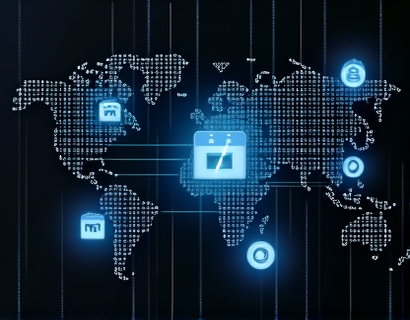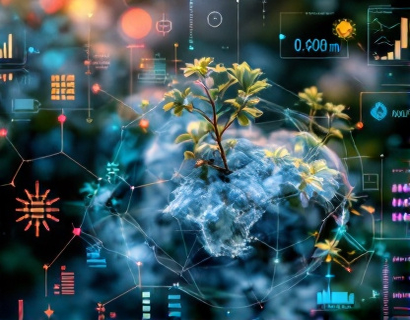Autonomous AI Agents: Streamlining Continuous Objectives for Business and Personal Productivity Boost
In the rapidly evolving landscape of business and personal productivity, the integration of Autonomous AI Agents stands out as a transformative force. These intelligent systems are designed to operate on behalf of users, managing a wide array of tasks and objectives continuously. By doing so, they enable businesses and individuals to concentrate on core activities that drive growth and success, thereby gaining a significant competitive edge. This article delves into the multifaceted benefits of Autonomous AI Agents, exploring how they can revolutionize productivity and efficiency in both professional and personal contexts.
The concept of Autonomous AI Agents is rooted in the advancement of artificial intelligence and machine learning technologies. These agents are programmed to understand, learn from, and adapt to their environment, allowing them to perform tasks with minimal human intervention. The core functionality of these agents lies in their ability to manage and optimize workflows, ensuring that objectives are met consistently and efficiently. For businesses, this means streamlined operations, reduced manual effort, and enhanced focus on strategic initiatives. For individuals, it translates to a more organized and productive daily life, with less time spent on mundane tasks.
Enhancing Business Productivity
In a corporate setting, the implementation of Autonomous AI Agents can lead to substantial improvements in productivity and operational efficiency. These agents can handle a diverse range of tasks, from scheduling and resource allocation to data analysis and reporting. By automating routine and repetitive tasks, employees are freed up to focus on higher-value activities that require human creativity and critical thinking.
One of the key benefits of Autonomous AI Agents in business is their ability to optimize resource utilization. For instance, an agent can monitor project timelines and automatically adjust resource assignments based on real-time data, ensuring that projects stay on track and deadlines are met. This dynamic adjustment capability is particularly valuable in complex projects with multiple dependencies and variables.
Moreover, these agents can significantly enhance customer service operations. Chatbots, a subset of Autonomous AI Agents, can handle a large volume of customer inquiries 24/7, providing instant responses and resolving common issues. This not only improves customer satisfaction but also reduces the workload on human customer support teams, allowing them to focus on more complex and critical tasks.
Personal Productivity Boost
For individuals, Autonomous AI Agents offer a powerful tool to manage and optimize daily activities. These agents can assist in organizing schedules, setting reminders, and even predicting and suggesting optimal times for tasks based on historical data and patterns. This predictive capability ensures that individuals can plan their day more effectively, reducing the cognitive load associated with constant decision-making and time management.
Personal finance management is another area where Autonomous AI Agents can make a significant impact. These agents can monitor expenses, categorize transactions, and provide insights into spending habits. By automating these tasks, individuals can gain a clearer picture of their financial health and make informed decisions to improve their financial well-being.
Additionally, Autonomous AI Agents can help in maintaining a healthy work-life balance. By automating routine tasks such as grocery shopping, appointment scheduling, and even fitness tracking, these agents allow individuals to allocate more time to personal interests and relaxation, leading to a more balanced and fulfilling life.
Practical Strategies for Maximizing Productivity
To fully leverage the benefits of Autonomous AI Agents, it is essential to adopt practical strategies that maximize their effectiveness. Here are some actionable steps for both businesses and individuals:
- Define Clear Objectives: Clearly define the tasks and objectives you want the AI agent to manage. This ensures that the agent focuses on the most critical activities and avoids unnecessary tasks.
- Integrate Seamlessly: Ensure that the AI agent is integrated with existing systems and tools. This integration facilitates smooth data flow and enhances the agent's ability to perform tasks efficiently.
- Monitor and Adjust: Regularly monitor the performance of the AI agent and make adjustments as needed. This includes fine-tuning parameters and updating objectives to align with changing business or personal needs.
- Train the Agent: Provide the AI agent with relevant data and feedback to improve its learning and decision-making capabilities. Continuous training enhances the agent's performance over time.
- Set Boundaries: Establish clear boundaries and limitations for the AI agent to prevent over-reliance and ensure that critical decisions are still made by humans.
For businesses, it is crucial to involve key stakeholders in the implementation process. This ensures that the AI agent's objectives align with the overall business strategy and that all team members are aware of the changes and benefits. Regular training sessions can help employees adapt to the new workflow and maximize the agent's potential.
Individuals can also benefit from setting specific goals for their AI agent, such as reducing daily planning time by a certain percentage or improving task completion rates. By setting measurable goals, individuals can track progress and adjust their approach as needed.
Challenges and Considerations
While the benefits of Autonomous AI Agents are substantial, there are several challenges and considerations to keep in mind. One of the primary concerns is data security and privacy. AI agents often require access to sensitive information, making it crucial to implement robust security measures and comply with data protection regulations.
Another challenge is the initial setup and integration process. This can be complex and time-consuming, requiring expertise in AI and system integration. Businesses and individuals should consider partnering with professionals who specialize in AI implementation to ensure a smooth transition.
Ethical considerations also play a significant role. It is important to ensure that AI agents are used responsibly and do not replace human jobs indiscriminately. Instead, the focus should be on augmenting human capabilities and creating a symbiotic relationship between humans and machines.
Future Trends and Innovations
The field of Autonomous AI Agents is rapidly evolving, with ongoing research and development leading to new innovations. One promising trend is the integration of emotional intelligence into AI agents, enabling them to understand and respond to human emotions. This could lead to more intuitive and user-friendly interactions, further enhancing productivity and user satisfaction.
Another area of innovation is the development of multi-agent systems, where multiple AI agents collaborate to achieve complex objectives. This approach can lead to more efficient and resilient workflows, as agents can dynamically reassign tasks and coordinate efforts in real-time.
Furthermore, the advancement of edge computing is set to enhance the capabilities of Autonomous AI Agents. By processing data closer to the source, these agents can operate with lower latency and higher efficiency, making them ideal for real-time applications and IoT devices.
Conclusion
Autonomous AI Agents represent a significant leap forward in the realm of productivity and efficiency. By automating routine tasks and optimizing workflows, these intelligent systems enable businesses and individuals to focus on high-impact activities that drive success. The practical strategies outlined in this article, along with an awareness of challenges and future trends, can help maximize the benefits of AI agents. As the technology continues to evolve, the potential for enhancing productivity and achieving sustained success becomes increasingly promising.











































